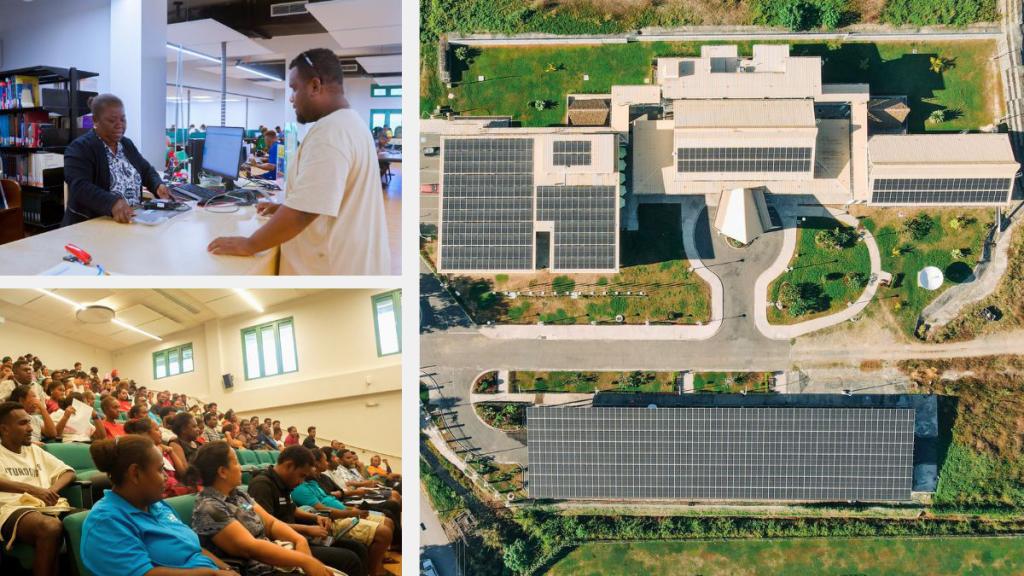BY NED GAGAHE
Guadalcanal Province has become the first province in Solomon Islands to pilot a national initiative that aims to strengthen disaster preparedness and climate resilience in schools.
This follows the official launch of the School-Based Disaster and Climate Risk Planning (SBRR/CCR) initiative at Mbalasuna Primary School, Guadalcanal Plains, on Monday, September 22, 2025.
The initiative is designed to enhance the resilience of schools and their surrounding communities by equipping education providers, school leaders, and students with necessary knowledge, tools, and systems to effectively prepare for and respond to disasters.
The initial rollout will cover 13 schools across 3 wards in Guadalcanal Province, serving as a model to create safer and more resilient learning environments throughout the Solomon Islands.
This program integrates disaster risk reduction and climate change adaptation into school planning and operations, aligning with both the national disaster management framework and climate resilience strategies.
“It is a privilege to stand here and launch this important initiative. Guadalcanal is proud to lead the way. These 13 schools will serve as models as we expand the program nationwide,” said Christopher Sakiri, Ministry of Education’s Deputy Secretary for Education Service.
The project is funded through generous support from Korea International Cooperation Agency (KOICA) and implemented with the technical expertise of UNICEF.
The program aims to improve children’s access to climate-smart infrastructure and essential social services, including education, health, water and sanitation, child protection, and social support systems.
The current rollout focuses on Output 1.4 of the education sector’s climate resilience plan—specifically, the integration of climate change into school planning and institutional capacity building.
“This is not just about responding to disasters. It’s about preparing our children and schools to thrive despite the challenges brought by climate change,” Sakiri said.
As part of the launch, MEHRD unveiled the revised School-Based Disaster and Climate Resilience Handbook, developed in collaboration with the Ministry of Environment and Climate Change, the National Disaster Management Office, and UNICEF.
The handbook offers practical steps for schools to assess risks, form disaster committees, run preparedness drills, and integrate resilience into their daily operations.
With Guadalcanal leading the pilot, Deputy Secretary Sakiri confirms that the program will be scaled up and introduced to other provinces in due course.
“We are proud that Guadalcanal is setting the pace. What we learn here will shape how we implement this program across the country.
“Together, we are building a future where our children are safer, smarter, and more prepared to face the challenges ahead,” Sakiri said.
UNICEF Solomon Islands Climate and Environment Specialist, Daeun Han, applauded the partnership between UNICEF, MEHRD, Guadalcanal Provincial Government, and KOICA, which made the initiative possible.
“Thanks to our partnership with KOICA, UNICEF is proud to support the Solomon Islands Government in building climate resilience for children and their communities.
“Children must not only learn about climate risks but also gain the skills to act on them. Embedding resilience into education empowers both schools and students to respond confidently to the growing challenges of climate change,” Han said.
Minister of Education for Guadalcanal Province, John Botsi highlighted the significance of the initiative, saying it marks a major step forward in building a climate-smart and disaster-ready education system in the Solomon Islands.
“Guadalcanal is honored to be the first to roll out this program. These 13 schools will serve as models as we expand this work nationwide,” Botsi said.
The launching was attended by key stakeholders, including the Ministry of Education and Human Resources Development (MEHRD), Guadalcanal Province, UNICEF, teachers from the schools involved, and community leaders.
Meanwhile, training for the 13 participating schools began immediately following the launch and will run over four days, led by education officers and facilitators.
Photos : UNICEF
For feedback, contact:[email protected]




